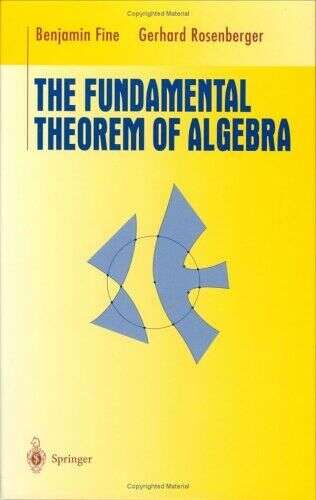This post assumes familiarity with some basic concepts in abstract algebra, specifically the terminology of field extensions, and the classical results in Galois theory and group theory.

The fundamental theorem of algebra has quite a few number of proofs (enough to fill a book!). In fact, it seems a new tool in mathematics can prove its worth by being able to prove the fundamental theorem in a different way. This series of proofs of the fundamental theorem also highlights how in mathematics there are many many ways to prove a single theorem, and in re-proving an established theorem we introduce new concepts and strategies. And perhaps most of all, we accentuate the unifying beauty of mathematics.
Problem: Let $ p(x) \in \mathbb{C}[x]$ be a non-constant polynomial. Prove $ p(x)$ has a root in $ \mathbb{C}$.
Solution: Without loss of generality, we may assume $ p(x) \in \mathbb{R}[x]$ has real coefficients, since if $ p(x)$ has no roots, then neither does $ p(x)\overline{p(x)}$, where the bar represents complex conjugation. In particular, $ p(x)\overline{p(x)}$ is invariant under complex conjugation, and all such quantities are real.
Let $ F$ be the splitting field for $ p(x)$ over $ \mathbb{R}$, and embed $ F$ in some algebraic closure of $ \mathbb{R}$. Consider the extension $ F(i)$. We claim $ F(i)$ is Galois over $ \mathbb{R}$; indeed, it is the splitting field of the separable polynomial constructed as the square-free part of $ p(x)(x^2 + 1)$, i.e., the product of all linear factors of that polynomial.
Let $ G$ be the Galois group of this extension over $ \mathbb{R}$, and note that since $ i \in F(i)$, we have an intermediate field $ \mathbb{R} \subset F \subset F(i)$, so that the degree of the extension $ F \subset F(i)$ is 2; so 2 divides the degree of $ \mathbb{R} \subset F(i)$, and hence the order of the Galois group $ G$ (recall $ |\textup{Aut}_{k}(F)| = [F : k]$ for any Galois field extension).
Since $ 2 \big | |G|$, there is a Sylow 2-subgroup $ H \subset G$, which by Sylow’s theorem has odd index in $ G$. By the Galois correspondence, $ H$ corresponds to an intermediate field extension $ \mathbb{R} \subset E \subset F(i)$ of odd degree (the degree is equal to the index of the subgroup $ H$). Since every real polynomial of odd degree has a root in $ \mathbb{R}$ (recall the intermediate value theorem), we see that there are no irreducible polynomials of odd degree $ d > 1$, and hence there can be no separable extensions of degree $ d$ (in particular, every such extension is finite and separable, and all such extensions are simple: the minimal polynomial of the singly-adjoined element must be irreducible). Hence, the degree of $ E$ over $ \mathbb{R}$ must be 1, i.e. $ E = \mathbb{R}$ is a trivial extension.
Taking this back to the group, since the index $ [G:H] = [E:\mathbb{R}]$ by the Galois correspondence, we have $ [G:H] = 1$, and hence $ G=H$ has order $ 2^n$ for some $ n$. We note that since $ \mathbb{C} = \mathbb{R}(i) \subset F(i)$, $ F(i)$ is a Galois extension of $ \mathbb{C}$. In particular the automorphism group $ G’ = \textup{Aut}_{\mathbb{C}}(F(i))$ is a subgroup of $ G$, and hence has order $ 2^k$ for some $ k$ dividing $ n$. We will show that $ k=0$, which occurs precisely when the extension is trivial (again, by virtue of being a Galois extension).
If $ k > 0$, then we recall the corollary of Cauchy’s theorem for $ p$-groups, that $ G’$ has a subgroup of order $ 2^j$ for any $ j < k$, and in particular a subgroup of index 2. But such a subgroup corresponds to an intermediate field extension of degree 2. As with the case for odd extensions of $ \mathbb{R}$, we note that there are no irreducible polynomials of degree 2 over $ \mathbb{C}$: we have the sing-a-long quadratic formula which constructs the roots in $ \mathbb{C}$. So $ k=0$, and hence $ F(i) = \mathbb{C}$ is the splitting field of $ p(x)$, and contains all of its roots. $ \square$
Want to respond? Send me an email, post a webmention, or find me elsewhere on the internet.